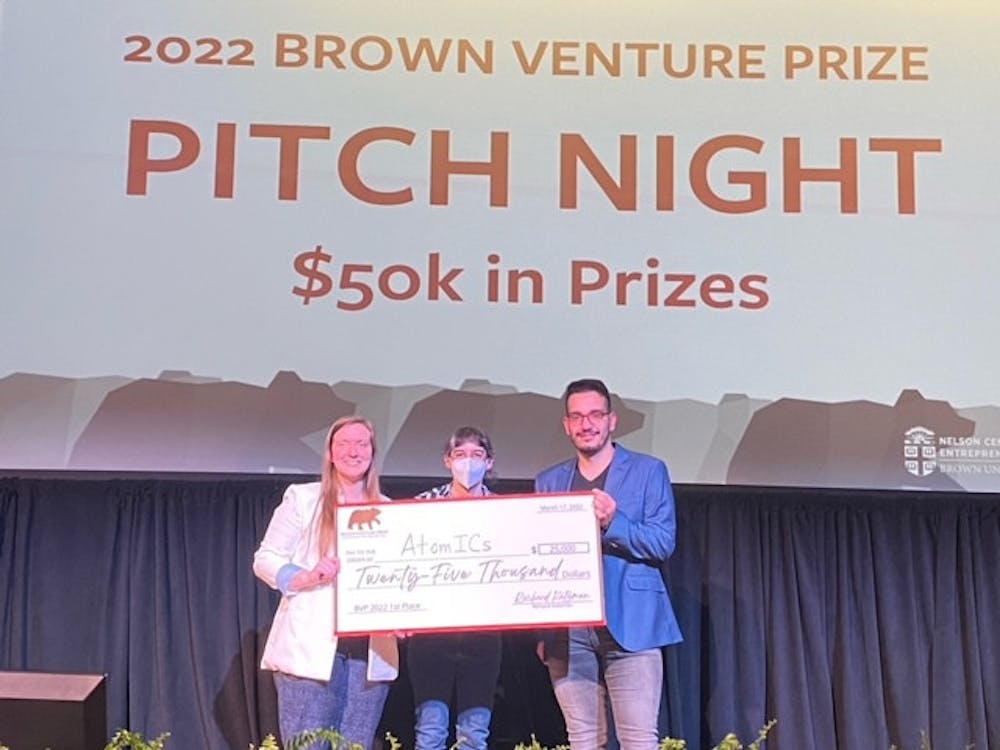AtomICs, a data storage and computing startup led by University researchers, won the first place prize of $25,000 at the 2022 Brown Venture Prize competition, The Herald previously reported. AtomICs is the first PhD student and faculty team to win a Brown Venture Prize and is led by Dana Biechele-Speziale GS, former Herald columnist Selahaddin Gumus GS, Assistant Professor of Chemistry Brenda Rubenstein ’07 and Associate Professor of Engineering Jacob Rosenstein ’05.
To “revolutionize the way we store and process digital data,” AtomICs aims to develop “new ways to use molecules to carry information” to solve the growing need for data storage, Biechele-Speziale and Gumus wrote in an email to The Herald.
Rubenstein’s chemistry lab and Rosenstein’s engineering lab have previously collaborated on research at the intersection between molecular science and data. Rubenstein and Rosenstein recruited Beichele-Speziale and Gumus to help commercialize the molecular data storage technology to “scale up and bring this revolutionary technology to market,” Beichele-Speziale and Gumus wrote.
Biechele-Speziale and Gumus pointed to the limitations of current data storage methods as motivating their research.
“Data centers are struggling to keep up with our explosive data creation,” they wrote. Currently, information is stored in solid-state drives that use transistors, which require chip-grade silicon, they added.
As a result, “prior to 2040, the demand for microchip-grade silicon will be 10 to 100 times the world’s supply, leaving the data storage industry facing a huge supply and demand challenge,” they wrote.
These transistors also produce an “enormous amount of heat, and, to keep the data cool, data centers around the world use more electricity per year” than some countries, they added. This cooling process also uses large amounts of water.
Given the already-compact size of modern transistors, “conventional technology is struggling to make data storage denser,” Beichele-Speziale and Gumus wrote. AtomICs uses “small molecules to enable denser, more sustainable and longer-term storage of data at room temperature when compared to conventional and current DNA-based competitors,” they added.
AtomICs has obtained a patent for their information storage process, which uses molecules to store image data. A mass spectrometer identifies whether a molecule is present or absent in a chemical solution to create a binary code. “From here, we use novel artificial intelligence to interpret these spectra and read out our image,” Beichele-Speziale and Gumus wrote.
“In past demonstrations, we've been able to show that we can store many megabytes of images in molecules,” Rubenstein said. With the funding from the venture prize, “our first aim will be to scale that up to the terabyte regime and then to show that it is more energy-efficient and also cheaper than comparative storage techniques.”
“After the first round of storage, … we're going to look further into how we can actually compute using molecules,” Rosenstein added. Achieving computation would involve finding a way to “create molecular circuits in a soft system,” which are biological systems or robotic systems made of flexible materials.
In the long run, “we want to realize a highly compact, highly energy-efficient way of storing information in molecules,” Rubenstein said. Ultimately, AtomICs’s goal is to “develop more in situ molecular computation capabilities,” she added.
“We’re very appreciative of the support that Brown has given us,” Rubenstein added. In addition to providing funding for the project, the University facilitated cooperation across different departments to make the project possible, she added.
“We hope that Brown will continue to encourage the idea that scientists make great entrepreneurs,” Beichele-Speziale and Gumus wrote.





